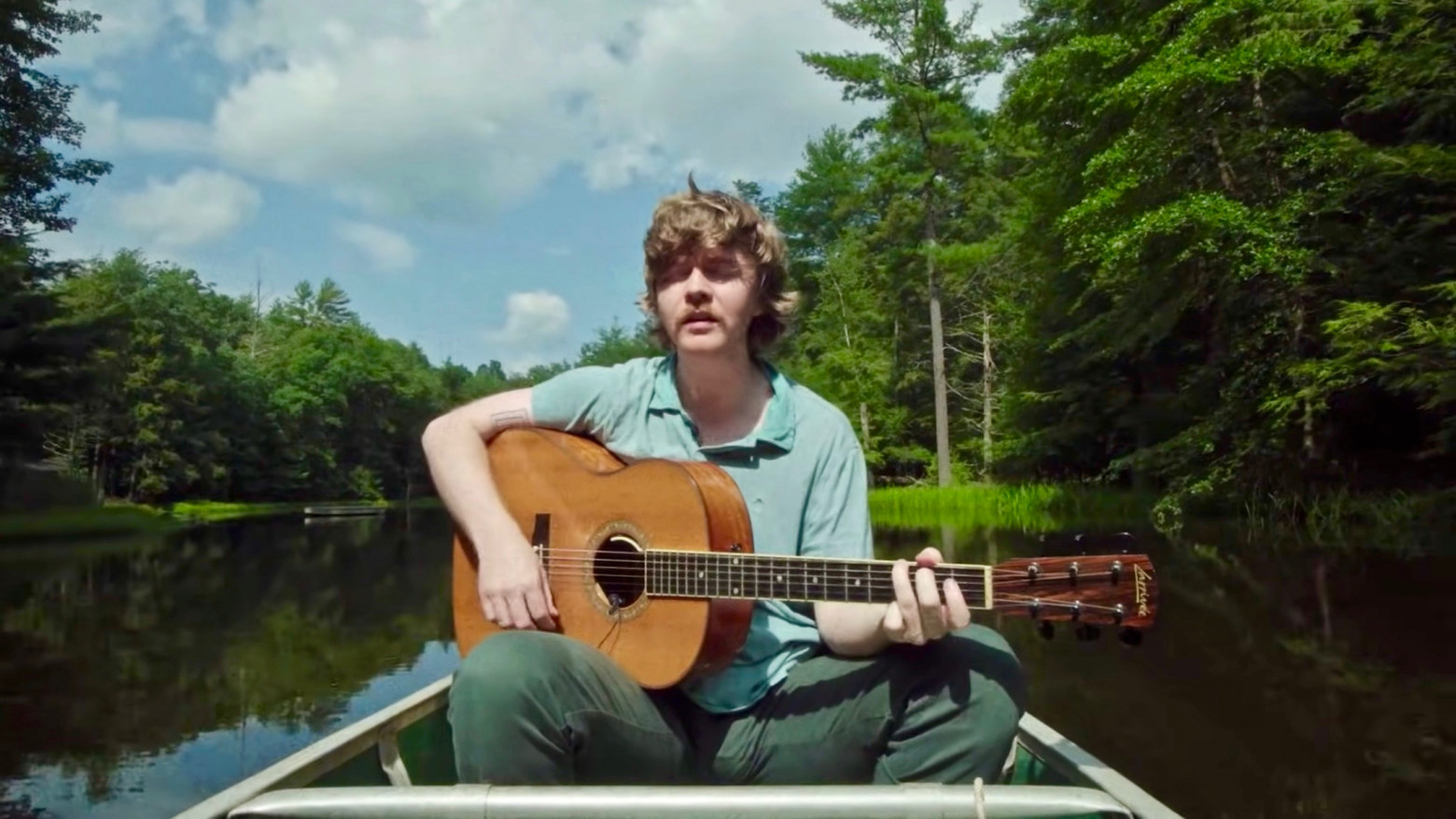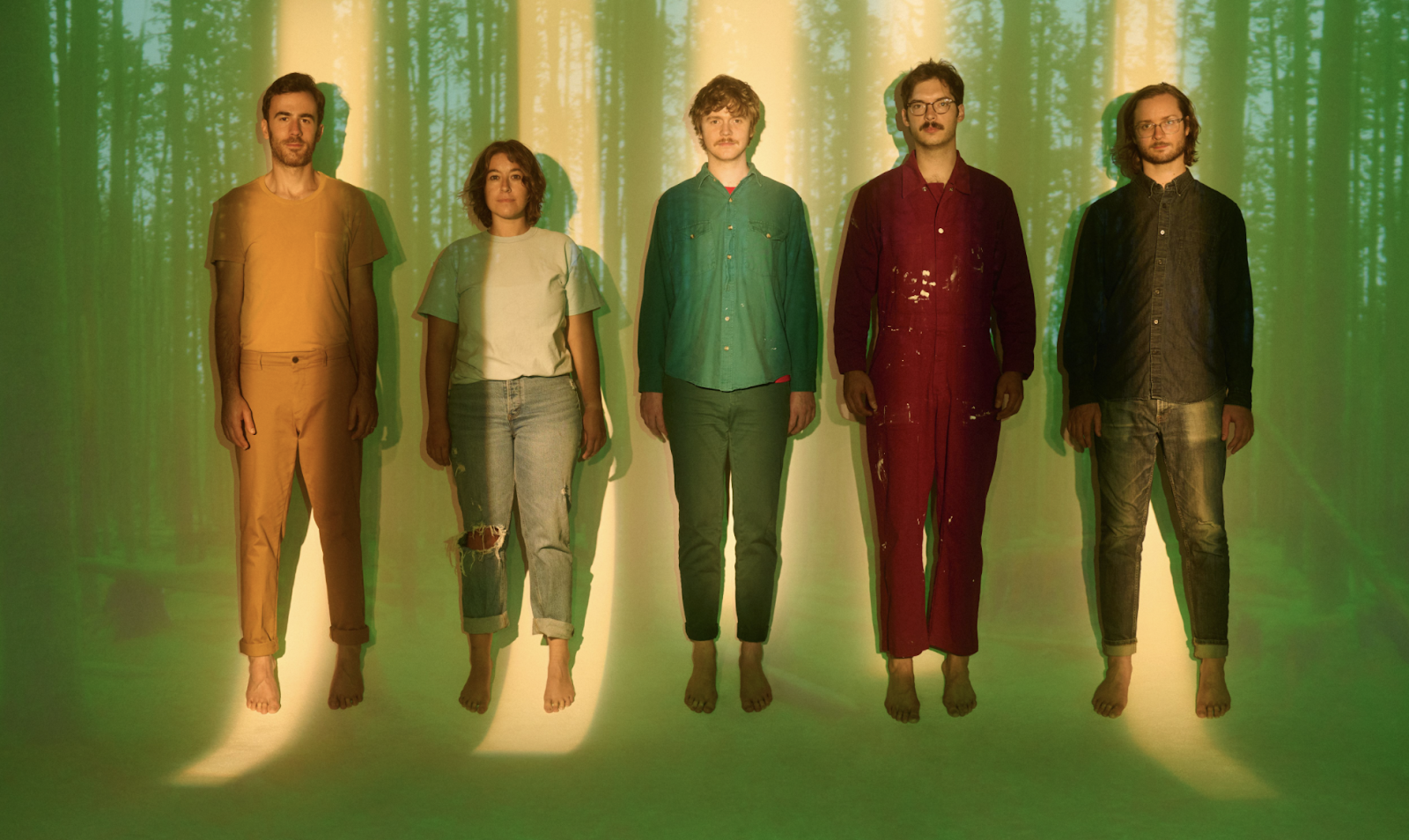
From "Orange" Acoustic Music Video (Photo courtesy Pinegrove)

From "Orange" Acoustic Music Video (Photo courtesy Pinegrove)
I’ve always viewed music as a voice acting on a generation’s cries for change –– from Crosby, Stills, Nash & Young’s song “Ohio,” to NWA’s “F*** Tha Police.” But as I scrolled through my “Discover Weekly” playlist on Spotify last week, I couldn’t help but wonder where the musical anthem of my generation might be hiding.
There’s certainly no lack of social justice issues to choose from in the 21st century, but I was particularly interested in songs about climate change. I didn’t expect much in the mainstream way — Somehow Ariana Grande’s new song from the movie “Don’t Look Up,” featuring the line “Get your head out of your a**. Listen to the goddamn qualified scientists. We really f****d it up, f****d it up this time,” didn’t seem as poetically transcendent as a Bob Dylan verse.
Instead, I looked back in the direction of folk and found Pinegrove, an indie rock band with a new album titled “11:11” on the way. From the first single on the album, titled “Orange” –– which was inspired by photos of an Oregon wildfire circulating the web –– to songs such as “Flora,” “Respirate,” and “11th Hour,” the themes of the environment and the increasing pressure of the climate crisis are clear.
In a recent interview, Evan Stephens Hall, singer-songwriter and frontman for Pinegrove, walked me through his songwriting process and inspiration behind the album. He also gave insight on how he incorporates activism in his daily life and how he copes with the current state of climate change.
This interview has been edited for length and clarity.
Q: Looking at the tracklist, most songs have some form of allusion to nature and climate change. Was this intentional from the start or was the larger theme revealed to you the more you wrote and recorded?
A: I always go in wanting to write honestly about whatever I’m thinking about and especially whenever I’m feeling. Between March and May of 2020, I was feeling a lot of pretty new things, and a lot of pretty intense things, and so it’s no surprise to me that a lot of climate anxiety made it onto the album. Once I started to see those themes, then I wanted to emphasize or strengthen the themes, so that each song could sort of speak to the other songs without, ideally, being too redundant.
Q: In the Youtube description of the song Orange, you describe “The ethereal, almost dissociative feeling of being alive at the end of history.” In particular, you sing the lyrics, “I try to laugh, or sleep it off. That awful feeling something’s off.”
Is this feeling –– that we’re witnessing the beginning of the end –– something that weighs on you often? How do you cope? And do you remain optimistic?
A: Yeah, you know, for every year between 2016 and 2020, I was so despondent. I cope with it by writing music –– and I also have to say one incredible way to work through it is to get involved. I’ve volunteered dozens of hours phone banking for Bernie [Sanders] and it really felt good to have conversations with people. I’ve moved from a place of actual despondency about our future to something a little bit… you might almost call it optimistic.
Q: How do you balance making a song that’s catchy and enjoyable to listen to while conveying a message about a topic as serious, and at times as complex, as climate change?
A: I do try to avoid being too didactic. I’ve always thought that it’s important for there to be enough space for the listener to put themselves in and step into the song and imagine it. At least for my vision, it needs to be sort of accessible in some way, and also abstract enough. There’s something interesting about saying something, but kind of reframing it as something more accessible. For me, it’s more like a catchy melody or something like that, but the idea is that there’s something for everybody there.
Q: As you said, often in music, people find comfort in relatability, where they can recognize themselves or their experiences in the lyrics. The interesting thing is as climate change affects more and more people globally, this too will have a greater sense of universality. Do you think in this respect, the number of songs about climate change will increase in the coming years?
A: How could it be any other way? More people will personally know somebody who’s affected or they themselves will be affected and I think we’re just going to see more people talking about it. Hopefully that results in some real change. But I wouldn’t think of it as a trend, it’s more of just like an alarm bell.

Q: It’s interesting because when I look to the past I see music and activism being so tightly linked. Where is the anthem for this generation?
A: I think that the way people consume music is a little bit different. I feel like everybody’s listening habits are very decentralized… But you’re right that music is a great format for activism. I think that [just music] won’t do on its own, but it’s part of the conversation.
Q: There’s certainly a faction of music lovers who believe musicians shouldn’t be activists and simply just want to hear them make music. There’s a certain ‘shut up and play’ aspect to it. Do you think musicians have a role as activists, to use their platforms for a greater cause?
A: There’s not a template that you can superimpose on every other artist, so I want to speak very narrowly here, but the way I feel is that I have a microphone and I want to say what’s on my mind. I’m making the sort of art that I want to make and people engaging with it is completely voluntary, so I really have no interest in entertaining this ‘shut up and play’ crowd.
Of course they’re saying stuff in the comments occasionally. But you know what, there are many, many more people who are saying like, ‘Thanks for speaking about this,’ or best yet, ‘I haven’t thought about it in this way.’
Q: Would you consider yourself an activist? Would you consider the music you create a form of activism?
A: I would, but I also want to push back slightly against just categorizing myself as an activist because in a certain way that says that I’m different than a regular person or regular citizen. In reality, the barrier to entry is non-existent. Absolutely anybody can be an activist. And I think that even if you’re thinking remotely revolutionary thoughts, or you’re interested, or you’re just feeling upset about the climate, to feel that grief fully is a revolutionary action, and we need you in the movement.
I’m not a policy expert, I’m not a climate scientist, But I do have a lot of experience writing songs. This is just what I have to give and I think that everybody has a role in the coming times, and we need to kind of humbly embrace what that is and do it, to the best effect. That’s the way community works.
Q: What are you hoping people will take away after listening to the album?
A: I hope that there are some people who will feel a little bit of comfort hearing these songs. It’s, in some small way, optimistic, though it’s honest about the challenges we face. Hopefully it’s a bit of a Rorschach. You can find what you need in the moment and that’s all welcome and that’s all good. I’m just happy people are listening.
—
